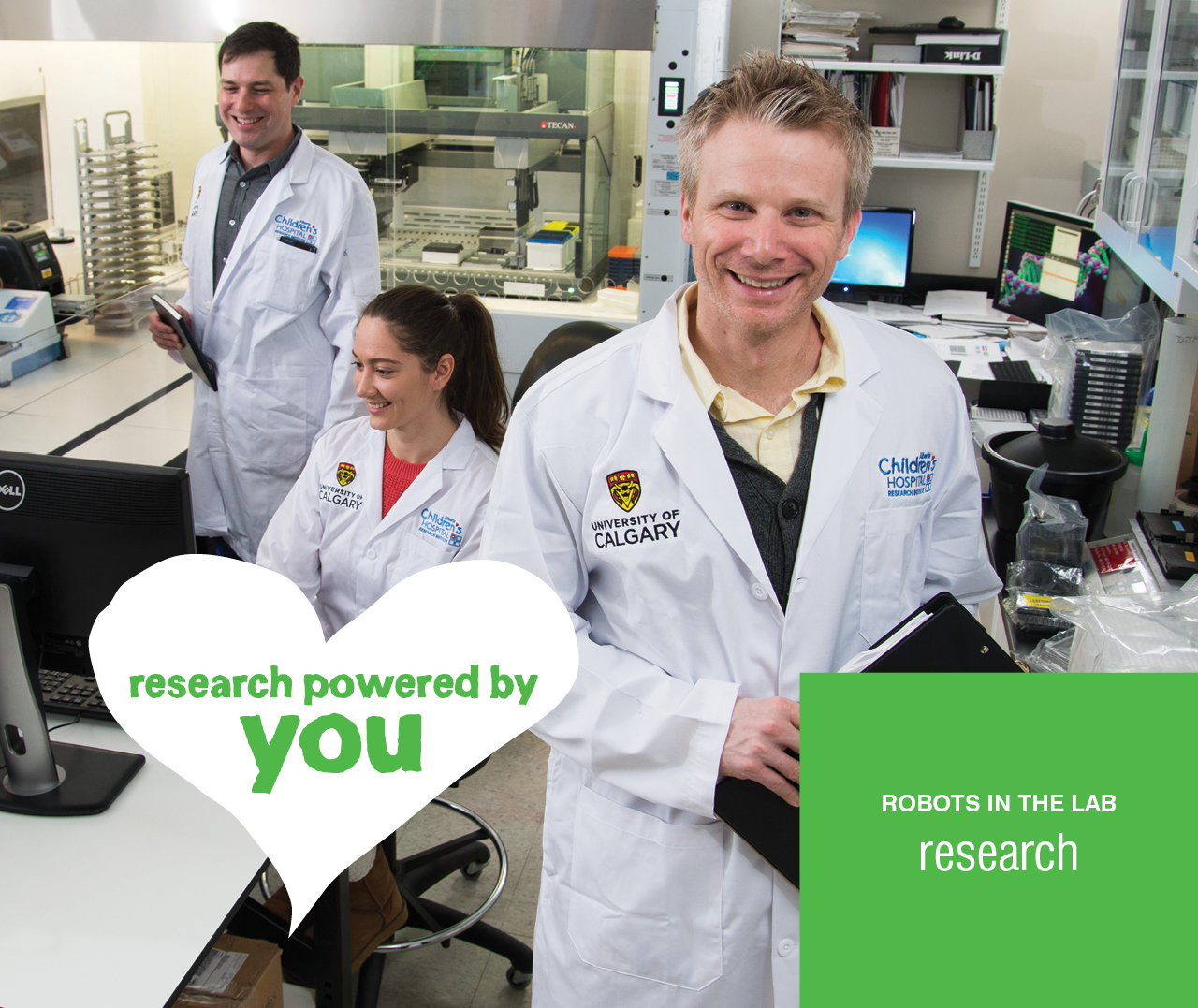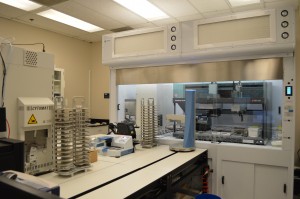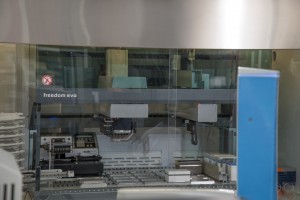
robots in the lab
“This High Throughput Screening platform enables us to automate our experiments and screen tens of thousands of genes at a time. When you consider the biological complexity of immunotherapy research – an immune cell fighting a cancer cell that’s fighting back, each with 20,000 different genes at its disposal – you begin to see the magnitude of our challenge and the potential of this system.” – Dr. Doug Mahoney
It’s been years in the making and now it’s here – a sophisticated research robot that is enabling Calgary researchers to screen and identify potential children’s cancer therapies at exponentially higher speeds than ever before. This High Throughput Screening platform is one of a kind in Alberta. It holds vast potential for childhood cancer research and it was made possible by you.
When Dr. Doug Mahoney moved from Ottawa four years ago to set up his research lab in Calgary, he had a vision of building an intelligent research platform that would allow his team to automate their experiments – using robots.

Dr. Mahoney is a pediatric cancer researcher, specializing in immunotherapy, a promising new research arena that strives to harness the body’s immune system to fight cancer cells.
“Scientists worldwide are exploring immunotherapy and the fruits of this research have recently come to bear for patients,” says Dr. Mahoney, a Kids Cancer Care-funded researcher, working in the Experimental and Applied Therapeutics research program at the Alberta Children’s Hospital Research Institute at the University Cumming School of Medicine. “Adults with lung cancer are being treated with immune-stimulating antibodies; adults with melanoma are being treated with natural immune cells; and children with leukemia and lymphoma are being treated with synthetically engineered immune cells. All of these patients are responding at unprecedented rates. Yet we’re only beginning to scratch the surface of this science.”
The process of screening and identifying cancer-fighting genes or antibodies is unimaginably complex and time-consuming. It can take months just to test all the genes of a single cell in response to one cancer cell.
There had to be a better, faster way.
After a successful Canadian Foundation for Innovation grant and a grant from the provincial government, Dr. Mahoney had raised $1,000,000 for the project – still $2,000,000 short of the $3,000,000 he needed.
Thanks to you, Kids Cancer Care was able to help fund most of the shortfall and Dr. Mahoney was able to move forward.
Working with experts in the automation design industry, Dr. Mahoney and his team began work on Alberta’s first automated research platform. After months of planning, programming and testing, the system is now operational.

The HTS platform enables Dr. Mahoney’s research team to automate experiments and screen tens of thousands of genes at a time. It can perform up to 20,000 experiments in the same time it would normally take a researcher to perform 10.
“It’s one of a kind in Alberta, and truly, I become giddy when I think of the experimental possibilities this platform affords us,” Dr. Mahoney says. “Without the support of Kids Cancer Care, this would not have been possible.”
Even more exciting, this smart research platform can run experiments around the clock – 24 hours a day, seven days a week – even when researchers have gone home for the day. Not only is it faster, but as a computer, it is infinitely more accurate and so minimizes the potential for human error.
Identifying the right gene, capable of fighting cancer, can be like finding a needle in a haystack. It is normally a painstakingly slow, methodical quest that sometimes yields little to no return on investment. The HTS platform should change this.
“The more experiments we can do, the quicker we can zero in and identify the promising genes or antibodies. And the sooner we can do that, the sooner we can interrogate and harness them for pre-clinical trials and, ultimately, for therapeutic purposes.”
In May 2017, after months of test experiments, Dr. Mahoney and his research associate Dr. Christopher Gafiuk conducted their first real experiment on the HTS platform. The results of their first experiment identified six hits, or six promising genes, out of the 600 genes they screened.
Their next step will be to further investigate these six genes to see if they live up to their potential. If they do, the results of this experiment may provide a starting point for new pediatric cancer therapies in the not-so-distant future.
Thank you for believing in our vision to quicken the pace of identifying new therapies for children with high-risk cancers.
Research powered by YOU.
Video production by Five Foot Five Video & Creative
